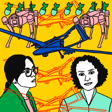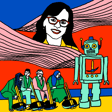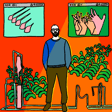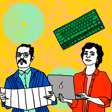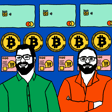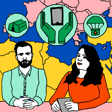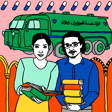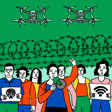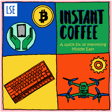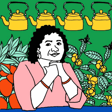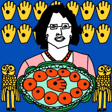Become a Creator today!Start creating today - Share your story with the world!
Start for free
00:00:00
00:00:01

1.11. Keeping the memories of Syria's disappeared alive with Wafa Mustafa
On the final episode of this season's Instant Coffee, Co-producer of Instant Coffee, Ribale Sleiman-Haidar, talks to Wafa Mustafa about her father's enforced disappearance and why the world should be doing more to help. Wafa is a Syrian activist, campaigner and journalist. She is a survivor of detention and member of Families for Freedom, a group of women-led Syrian families demanding freedom for all of the country’s arbitrarily detained and forcibly disappeared citizens. Families for Freedom: syrianfamilies.org/en/
Transcript
Foundation of international relationship
00:00:00
Speaker
I did not surprise the UN Security Council members with what we demanded. I did not surprise them with what's going on in Syria. I believe that our relationship with the international community is not based on hope, but rather based on determination. I will keep repeating what I'm saying, and all of us are doing the same
00:00:23
Speaker
We don't have any other option. We'll just keep repeating everything we're doing. We'll keep repeating our demands till they listen to us.
Interview with Wafa Mustafa
00:00:43
Speaker
In our final episode of this season, instant coffee's Rubal Sleiman Haidar speaks with Wafa Mustafa about her father's enforced disappearance in Syria and why the world should be doing more to help. Wafa is a Syrian activist, campaigner and journalist, a survivor of detention and member of Families for Freedom, a group of women-led Syrian families demanding freedom for all of the country's arbitrarily detained and forcibly disappeared citizens. Over to you, Rubal.
00:01:11
Speaker
Hi Wafa, thank you so much for talking to me today. How are you? I'm fine, thank you. And thank you for inviting me to this conversation. I'm very excited. We're very excited to be having you here. How's Berlin? How's everything going? It's going, I guess. It's going well. We have some restrictions now.
00:01:30
Speaker
But I guess this applies to the whole universe though. Yeah, it's strange times to be alive to be honest. So I'm really looking forward to talking to you about yourself, your work and how you got to where you are today. You work with families for freedom and everything you're doing since your dad was arrested around nine years ago in Syria is really inspirational and
Political upbringing and activism
00:01:59
Speaker
also very brave. I wanted to ask you about how you became so political in a way. Would you say that it was your dad's arrest that forced you into it or were you politically engaged before that?
00:02:14
Speaker
Well, no, I mean, I've, I would say that I was born political somehow. When I was born, my dad decided to give me a name of a Palestinian news agency. So the minute I was born, he saved, or at least he contributed in shaping my identity. And that played, to be honest, I mean, our names play a huge role in our identities and lives.
00:02:39
Speaker
And mine did as well, but that was just one detail of many, because I mean, since I was 10, I guess, or nine, my dad started taking me to protests supporting the Palestinian coast, supporting Iraq. So I've always been in such events, in such conversations,
00:03:07
Speaker
about what's going on in Palestine and how is that not very far from us and what we can do. I mean, I was just a kid, but and also, I mean, in Syria, you know, walls have ears, so you do not really talk about politics at home. You do not really
00:03:27
Speaker
you're not supposed to talk or even to listen to such conversations. But we did. I mean, since I was born, my dad was always watching the news, was always having conversations with friends about politics and about our country and about how this country is not
00:03:48
Speaker
Is not actually free and is not democratic. So yeah, I mean, I was I was raised listening to this and going to protest with my dad. So I would say that was that that actually started my whole like, I don't know, this political aspect of my identity.
00:04:06
Speaker
And yeah, this is why when, when, when my dad got arrested on the 2nd of July, 2013, I mean, to be honest, it wasn't something we did not expect because my dad was even arrested before the revolution and also at the beginning of the revolution in 2011. So we've, we've always knew that, that this will happen.
Life under threat of arrest in Syria
00:04:28
Speaker
But unfortunately, knowing that doesn't make it any easy. And did you, did you in any way talk about it?
00:04:35
Speaker
With him before, was it a thing that you discussed? You mean like political activism or? Or him being arrested? Yeah, I mean, we definitely did. I think everyone in Syria did, especially people who were quite active because we knew that, I mean, since they won, we knew that any of us could be arrested at any moment. And I guess all families in Syria did this conversation.
00:05:04
Speaker
where they told each other that if I get arrested, I want you to do this and this and this. And we had this conversation with my dad and he said that if I get arrested, I just want you to leave the country because in Syria, and this probably applies to many other countries, unfortunately, this is the nature of detention and enforced disappearance, that the authorities when they arrest someone, especially men,
00:05:30
Speaker
They usually arrest other family members, especially women, to put pressure on the detainees to admit stuff they didn't even do. And because of that, my dad actually asked us to leave the country if he gets arrested, especially that he was arrested before. And me and my sister were also arrested at the beginning of the revolution, so we had a record.
00:05:54
Speaker
And we knew that it would be even more difficult for him if they actually used us to pressure him.
Challenges faced by families of detainees
00:06:03
Speaker
That brings up a good question that I had as well.
00:06:07
Speaker
Looking at families for freedom, you say that you're a women-led movement, which of course is very empowering, but at the same time, the sad truth behind that is the fact that most of these women were kind of forced into this position because they lost the man of their household. What are the practical difficulties that you face when the man is detained as a family? Practically, how do you manage?
00:06:33
Speaker
Well, it is very difficult and this is something we usually tend just to maybe ignore because sometimes the emotion of the psychological aspect of it is more, I don't know, present. But especially if you are born and raised in a country where actually men are said to be the ones who actually support the family financially and
00:07:03
Speaker
I mean, I come from a quiet, liberal family. So my mom was also working, but still my dad was the main supporter of the family financially. And losing him was very surprising on many different levels and was very difficult on many different levels. Because of that, we had to flee the country. So fleeing the country as three women
00:07:27
Speaker
I mean, I, it was me, my mom and my sister who was back then 13 fleeing the country, just the three of us and illegally was, was very dangerous. And moving to another country, which language, which culture, which geography we know nothing about was not easy. I mean, this is not easy to anyone, especially if you are just women.
00:07:53
Speaker
And we fled with nothing. I mean, we only had our passports. We didn't have any money, financial support, or whatever. And we fled with this burden of losing our debt. But we still had to do daily tasks and to survive.
00:08:13
Speaker
which is very difficult. We had, I had to find a job. I had to support my family financially. We had to rent a house. And in this, this could happen anywhere, especially if you are a woman, you are in a position where it seems easier for others to exploit you and to use you and to pressure you. So it wasn't easy to be honest. I mean,
00:08:39
Speaker
I would say that we survived. This is only one aspect of it, which is not easy at all. I mean, dealing with all of this, you cannot really think of any future or any careers. I mean, your priority is not only to survive, but also to support your mom and your sister and for them also to support each other. So that was not normal by any standard.
00:09:05
Speaker
And did you feel when you got to your new home in a way, did you feel like you could find the community there for support or did you still feel alone?
Finding community in Germany
00:09:17
Speaker
Well, I mean, in Turkey it was a bit different but in Germany it feels like, I mean, I wouldn't call Germany home. I'm pretty strict about this but
00:09:29
Speaker
But I definitely found a community that actually shares with me everything I want to do, everything I believe in. I mean, Families for Freedom was very crucial in my life. When I learned about them, when I joined the Gayo
00:09:45
Speaker
a lot changed in my life. I've been more encouraged and motivated to do things. I was before that also psychologically, I wasn't very well. I'm still struggling like all of us, but yeah, I feel less lonely, I would say, definitely. I feel more motivated. Yeah, I feel like a part of many different families.
00:10:14
Speaker
Also looking at, I mean, unfortunately, a lot of countries and people around the world and in the Middle East have gone through similar experiences.
Building global solidarity
00:10:23
Speaker
I know, for example, personally, from the Lebanese Civil War, where tens of thousands of people were forcibly disappeared. Do you, as a movement, have connections with other communities who have shared experiences? Where do you learn from them? Do you connect to them?
00:10:40
Speaker
Yes, actually, we do and we paid and still paying attention to this important aspect. We think that it's very important to exchange and to get to know other experiences from other countries, from other contexts. As Families for Freedom, we've had contact with a group of women from mothers of Cypenica, from Bosnia,
00:11:05
Speaker
now we've been in contact with a group of those who actually work on or who are actually concerned
00:11:15
Speaker
with issues related to detention, enforced disappearance, torture, justice, and accountability in many different countries like Chile, Argentina, Nepal, and other places. And we think that this is very important because, I mean, on a personal level, I believe that linking what's going on in Syria to a bigger struggle is very important because what's going on in Syria is not
00:11:42
Speaker
exclusive to Syria and to the Syrian context, using detention and enforced disappearance as a tool to terrorize civilians and to oppress liberal movements has always been happening all over the planet and throughout the history.
00:12:01
Speaker
And getting to know other experiences and to know how they dealt with it and how some of them are still dealing with it is very important. And actually, I think that as family, I would say that as family for freedom, we actually, we care about this and we are trying our best to connect with other groups.
00:12:20
Speaker
Yeah, I completely agree. Speaking of taking the issue to the international community and making it bigger than Syria, I know that you're very outspoken about
Frustration with international inaction
00:12:34
Speaker
it. You've also spoken, for example, to the UN Security Council recently to gather support from the international community. But nine years after the Syrian revolution has started, it seems like the world is slowly accepting the fact that Assad has remained in power.
00:12:50
Speaker
And how much hope do you have in the international community? What do you expect of the world's governments and people? This is always a tough question.
00:13:01
Speaker
I already went to the UN Security Council session with much frustration, to be honest. And this is not because I wanted to, because it is actually like this for years. I've said this many times. I did not surprise the UN Security Council members with what we demanded. I did not surprise them with what's going on in Syria. My story is not something they
00:13:29
Speaker
They, I don't know, they were surprised by, you know, last year, two other colleagues of mine from Family Soil Freedom also briefed the council. We've been for years demanding one thing.
00:13:41
Speaker
a resolution on detention and enforced disappearance in Syria, putting pressure on the Syrian regime and all other actors to just release all those who are detained, kidnapped or enforced disappeared, especially now we're talking about COVID-19. I mean, this is crazy. It's even more urgent.
00:14:02
Speaker
Now, I mean, in Syria, as we all know, the government is not very transparent about cases in Syria and about what's going on, how people are dealing actually with COVID-19. Doctors are being arrested in Syria only for speaking about cases they saw. And this is happening in the country without talking about detention centers and prisons, without talking about people who have been there for years in very
00:14:31
Speaker
very bad situations and very horrific conditions. So yeah, I mean, I said all this to the council and it's not that I did it because I had the hope that something will change immediately. I believe that our relationship with the international community is not based on hope, but rather based on determination.
00:14:55
Speaker
It's not that I have hope that they will do something. I believe that I will keep repeating what I'm saying and all of us are doing the same. We don't have any other option. We'll just keep repeating everything we're doing. We'll keep repeating our demands till they listen to us. There is no other option.
00:15:16
Speaker
What would you want people like
Maintaining Syria's narrative
00:15:19
Speaker
us to do? How can we support you? Looking at what's going on everywhere. This world is just very crazy. We all feel useless because many things are happening and this injustice sometimes I mean I just I'm shocked by this by how by how we are just accepting injustice or maybe how we are very
00:15:41
Speaker
helpless. But I believe that at least when it comes to Syria, I believe that the battle now with the Assad regime is over narratives. Creating this collective memory regarding Syria and regarding what happened and what is still happening is very crucial. This is something we can all contribute to. It's not exclusive to Syrians and to those who witness the revolution inside Syria. I mean,
00:16:06
Speaker
We have hundreds of thousands of detainees, those who we do not even know if they will be back. I believe that it is our duty to preserve this narrative. You can see that it's very crucial for the Syrian regime. Now we have Russia, who is providing a huge propaganda about everything happening in Syria. So at least learning about what's going on, talking about it,
00:16:35
Speaker
spreading the information we know and getting the information from trusted sources is good enough, I would say. I mean, this is what I'm doing. I mean, I'm just trying to tell people that this is happening and we should just talk about it. Let's just talk about it. Everything is effective because this is not a war.
00:16:59
Speaker
In my opinion, this is a daily struggle.
Importance of storytelling and memory
00:17:02
Speaker
To be honest, in short, I'm doing all this just to keep my father present in my life and in other people's minds and memories. I just believe that we only exist if we are remembered. And if each of us helps in preserving the memory of someone, then this is good enough.
00:17:26
Speaker
Well Wafa, I'm afraid this is all the time we have today, but thank you so much for speaking to us. It's been a pleasure hearing about you and all the inspiring work you are doing. You said it so well, we only exist if we are remembered, so I hope we all keep talking about those who are missing in Syria and everywhere else in the world so they are never forgotten. Thank you again.
00:17:47
Speaker
Well, thank you so much because I believe that this platform and this opportunity is very important for me and for all others who do not have platforms to speak out. So thank you so much.
00:18:05
Speaker
Thank you Waffa for taking the time to speak to us and thank you for listening to Instant Coffee, your quick fix of everything Middle East. We'll be back with brand new material in
Follow Instant Coffee on social media
00:18:14
Speaker
the new year. In the meantime, you can listen to our previous episodes on SoundCloud and Apple Podcasts. Don't forget to follow us on Twitter, Facebook and Instagram to be the first to hear about a new season.

